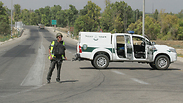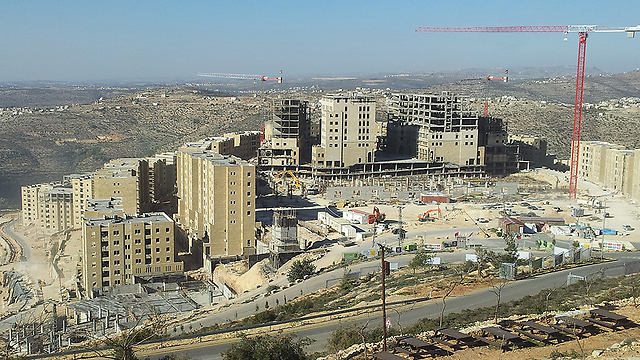
Israel increases relief measures to Palestinians in West Bank
Palestinian men over 55 and women over 50 will be allowed to enter freely, freeing up 2,000 work permits for Palestinians in Israel; 100 Palestinian doctors working in Jerusalem can now enter Israel with their cars.
Israeli security forces are preparing to expand relief measures for Palestinians in the West Bank in an attempt to maintain the relative calm in the territories.
Consistent coordination between the Coordinator of Government Activities in the Territories (COGAT), the Israel Civil Administration, and their Palestinian counterparts is key to the continuation of a volatile yet relatively secure situation in the West Bank.
This cooperation is bolstered by a number of measures formulated by the Civil Administration as relief for the Palestinian population, including some that have never been taken in the West Bank and some that have not been seen since the 1990s - in the period between the signing of the Oslo Accords and the outbreak of the Second Intifada. Some have already been enacted over the past few months, while others are expected to soon take shape.
Thus, for the first time since the al-Aqsa Intifada erupted in 2000, around 100 Palestinian doctors who work in Jerusalem hospitals have been allowed to drive their cars into Israeli territory in order to get to work, and can now drive anywhere in the country. The change was made a few weeks ago, and security forces are contemplating expanding it to others who have special permits, but not to the entire population.
Owners of Palestinian quarries in the West Bank have been, for the first time in years, allowed to use explosives for controlled explosions in order to save months of quarrying. The explosions are carried out solely by Israeli contractors.
Large Palestinian factories in the West Bank received permits to use multipurpose fertilizer, which could be used to make explosive devices. The upshot is a notable increase in the number of workers.
Additionally, organized groups of Palestinians are allowed to leave for day trips around the country on buses. Three buses from the village of Ni'lin traveled north on the recent Nakba Day, while the village demonstrated against Israel.
Rawabi, the first Palestinian city built since 1967, is expected to begin housing its first family in about a month. The city has finally been connected to Israel's water supply after lengthy delays, and the paving of a new road from Rawabi to Bir Zeit is expected to be approved soon. An event celebrating the first time a family moves in will take place in the city's large theater hall.
Any Palestinian man over 55 and woman over 50 can enter Israel freely – a potential 400,000 people. This is an unprecedented step not seen even in the early 1980s, and it frees up 2,000 work permits for Palestinians. There are 52,000 Palestinians holding a permit to work in Israel, another 26,000 Palestinians are allowed to work in the settlements, and 20,000 Palestinian merchants have permits to work in Israel.
Furthermore, the age required for married Palestinians to go to Israel for a few days to look for employment has been lowered from 24 to 22.
Access roads have been opened or paved to shorten journeys. Nine plans to expand Palestinian villages in Gush Etzion and around Hebron have been approved. However, pro-Palestinian organizations claim that Israel does not allow the expansion of cities and villages and stops construction of many buildings.
Tens of thousands will be allowed to pray in Jerusalem and travel in Israel ahead of the upcoming month of Ramadan. The infrastructure at border crossings is to be improved and soldiers will be instructed to behave courteously towards the fasting Palestinians.
The permits and relief measures do not apply to several thousand Palestinians with travel restrictions because of past security problems.
The security forces' goal is to allow a reasonable living standard even in situations of unusual violence in the West Bank or a major terror attack.
The decision to take relief measures was made despite concern in the IDF that 2015 will be a year of escalation in the West Bank in view of the stalled peace process and the diplomatic measures taken by the Palestinians on the world stage to join a list of international treaties and organizations, including the International Criminal Court (ICC).
This concern manifested earlier this year in a series of large-scale exercises by brigades, divisions, and the IDF's General Staff, all of which practiced troops' preparedness for major outbursts of violence in the West Bank.











